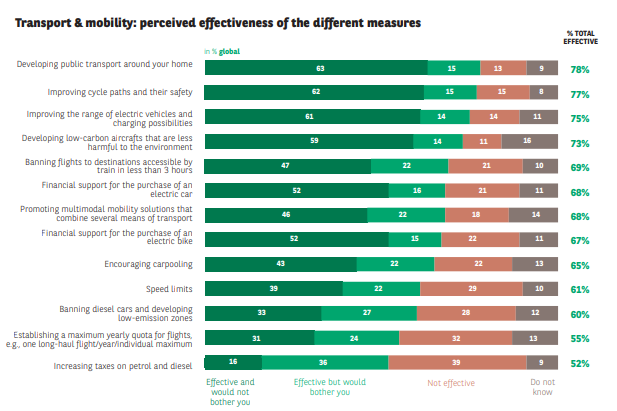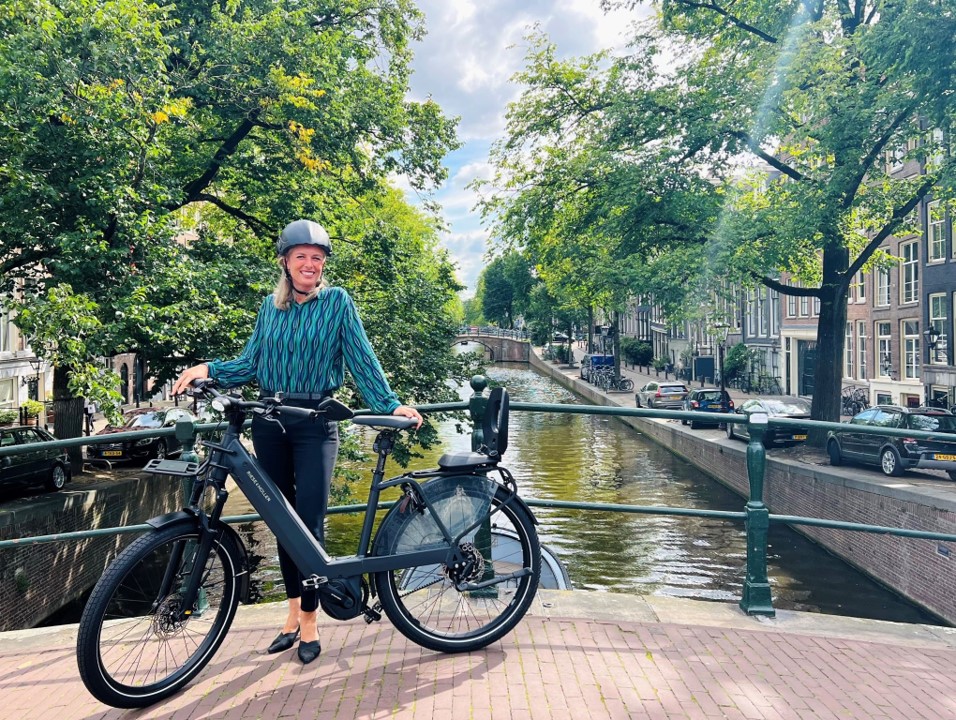77% of Europeans want to invest in bicycle infrastructure
The increasingly visible consequences of global warming and rising energy costs are driving changes in energy consumption and mobility behavior. According to research by BNP Paribas, 64% of Europeans are using their cars less due to increased costs and concerns about climate change. Cutting transportation costs can be achieved by working from home more frequently, but this isn’t feasible for workers in industries such as manufacturing, hospitality, education, or construction. The impacts of rising costs are thus not evenly distributed. Making cheaper and sustainable alternatives more attractive leads to climate benefits and a fairer distribution of burdens.
Equitable alternative to cars
In the Netherlands, with its flat terrain and an average commuting distance of 22 kilometers, bicycles are already widely embraced as an alternative to cars. With the rise of electric bicycles, they are often the fastest mode of transportation in urban areas. Investing in bicycle infrastructure and providing fiscal incentives for bicycle use are telling examples of green policies that are inclusive for all income groups. Such inclusivity is not always a given in sustainable policies. The energy transition requires systemic changes, the burdens of which are often unintentionally unequal. Investments in solar panels and insulation, for instance, are often unattainable for households with the lowest incomes. As a result, they risk falling even further behind as energy costs rise.
Promoting bicycle use doesn’t exhibit this imbalance. It is a cost-effective mode of transportation that requires minimal capital investment, especially when compared to owning a (second) car. Developing safe bicycle lanes, secure bicycle parking, and providing fiscal incentives for electric bicycles also enhances livability and improves health. Designing urban areas around bicycles and public transportation also prevents car ownership from yielding economic advantages that widen inequality.
The path to fairer mobility: the bicycle path
The bicycle path doesn’t just lead to a fairer future; it’s also a fantastic export product for the Netherlands, with opportunities for green growth. Dutch experts assist in the development of car-free cities, and leading bicycle brands can benefit from the growing demand that follows.
In maintaining public support for the energy transition, promoting green alternatives is more effective than restrictive policies. Ipsos research commissioned by BNP Paribas reveals that 77% of Europeans believe that investing in bicycle infrastructure is effective. There is less support for increasing fuel taxes, partly because many respondents also acknowledge that, despite its effectiveness, it would bother them personally. Moreover, this measure places car ownership further out of reach for the lowest income groups, thereby impacting social mobility.


Dagmar van der Plas, Head of Marketing, Communication & Company Engagement at BNP Paribas The Netherlands: “Every day, I come across numerous clever solutions that help our business customers achieve sustainable growth or encourage individuals to make green choices. Even in the realm of bicycle use, there are a multitude of different initiatives being developed within BNP Paribas in the Netherlands.
For instance, BNP Paribas Leasing Solutions is developing new products to make electric bicycles more accessible, and Arval BNP Paribas is evolving from a traditional leasing company into a mobility partner. This means they offer integrated solutions that combine shared mobility, bicycles, public transportation, and electric cars. Employees remain flexible, but the choice to leave the car parked a few days a week becomes more attractive.Also within our own organization, bicycles are becoming increasingly important.
For example, this week we announced the launch of our new bicycle leasing program in collaboration with Arval BNP Paribas and the bicycle leasing platform Hellorider. Employees have the choice of hundreds of bicycles and can receive up to 40% off on purchase and maintenance. Combined with some electric tailwind, we’re helping our colleagues leave their cars parked and get on their bikes.”